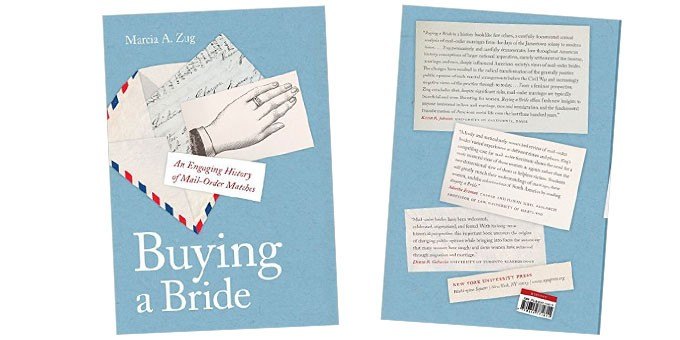The amount of disinformation out there about the modern mail order bride industry is stunning.
Most of what you hear about international dating in the media is simply bunk and what you read on message boards and social media is often even worse. So, who can you trust?
Academic researchers! The ones who have done fieldwork on international dating. They travel the world to ask women why they sign up to meet foreign men. They watch singles tours, talk to lonely men, and track couples for years after they are married. These are the experts who read the government reports and write peer reviewed academic articles and books.
These are independent experts. These scholars have a perspective no one else has, because they are not making any money off of the industry. They are simply trying to discover the truth.
All of these academics – every single one – was a self-described feminist, and nearly all of them are women. Even more surprising is that most of these women were certain – absolutely certain – they were going to uncover a worldwide criminal conspiracy of human trafficking and sexual slavery when they started researching international dating, but after they interview couples, watch international matchmakers in operation, and review a mountain of government reports on crime and immigration they nearly all change their minds.
This makes their conclusions even more compelling, because in many of these books, papers, and dissertations you get a real feel for how difficult it was for these scholars to realize that their initial theories were simply wrong. This is particularly true of young scholars, because they know they are rejecting the popular narrative and risking ruining their nascent academic careers.
Why Academic Research Matters
Academic research is different from other writing, because it is reviewed before publication by other scholars. The books of Zug and Constable were reviewed by the editors at the New York University Press and the University of California Press respectively, but also by a group of outside “peers.” These peers are anonymous experts who comment, often in great detail, on a work’s conclusions.
The author of a peer reviewed work has to answer these comments to the satisfaction of the editors before publication. It is often a long and trying process.
On dissertations it is worse. The dissertation is the final step in the process of earning a Ph.D. for a young scholar and it is often torture. Their dissertation must be approved by a committee who will often tear it to shreds, sometimes forcing them to completely start over, and in some cases failing them.
This is why writing a dissertation expressing an unpopular conclusion takes real guts. If your arguments are not strong enough to convince everyone on your committee you have just wasted the previous three to five years of your life.
This review process is why academic research deserves such serious consideration. If done correctly it is a very powerful tool for exposing bias and misinformation. But of course, results can be manipulated. It happens far more often than it should, but when an academic gets caught massaging their data it is usually the end of their career.
And sometimes, professors do non-peer reviewed research. Professor Hughes’ testimony to Congress discussed below does not appear to have been peer reviewed and it shows in her selection of topics and interpretation of her results. Sometimes professors still write opinion pieces without having done any fieldwork on the subject too. Those are usually filled with uniformed misinformation.
The Early Researchers
In her dissertation, Lisa Ann Simons, one of the first scholars to do real field work on international dating, admits that she started her research assuming that international dating was an abhorrent practice only one step away from human trafficking. She writes that , “I decided this “appalling” practice needed further investigation to expose the horrors, in the hope that something might be done to stop it.” (p. viii)
This was in the late 1990s, and most of the academic writing on international dating published at that time was not research. It was just discussions of feminist theory that railed against the term “mail order bride,” vilified the men seeking to marry foreign women as brutes, abusers and criminals, and infantized the women seeking to marry them as naïve, uniformed, and passive players unable or unwilling to avoid the clutches of the evil mail order bride dating agencies. In short, these were the paranoid fantasies of bitter feminist intellectuals, and as Simon dove deeper and deeper into her research she began to realize that this popular narrative was simply wrong.
Eventually, Simon concluded that the, “…that the standard views on the topic were at best simplified and at worst untrue.” (pp.viii- ix) She wrote:
My preconceived notions, shaped by the media and women’s advocacy community, were wrong. My research did end up revealing gender bias; however nothing in the data was as I had expected. The gender bias I found was located more in the camp of feminist research than in the practice of matchmaking as I had assumed I was going to find. (p. 267)
This should cause even the most cynical critic of international dating to reconsider their opinions, because Simon’s work occurred during the late 1990s and early 2000s. International dating, the internet, a free Eastern Europe: it was all new.
There were a lot of shady dating agencies, particularly the ones based in Eastern Europe where society was going through a painful reorientation after seventy years under communist rule. All of the former Warsaw Pact nations suffered to one degree or another from underfunded and corrupt criminal justice systems that did not have the time, energy, or resources to properly investigate complicated crimes like internet fraud or dating scams.
It was wide open. The United States and other developed nations did not have any special laws like IMBRA which eventually greatly reduced the worst excesses of the 1990s mail order bride boom.
Still, Simon eventually concluded that in general it was a positive for both the men and the women.
She wrote that, “My data offer preliminary evidence that the international matchmaking industry can be seen as a positive force in the context of shifting gender relations within and between the countries involved.” (p. 308)
A Foreign Affair’s Role in Simon’s Research
Simons’ research was extensive. She conducted seventy-two interviews not only with men and women using international dating agencies, but also with government officials, staff from non-governmental organizations focused on women’s issues, and the staff members of five different agencies, including International Love Scout’s favorite international dating agency, A Foreign Affair.
In fact, AFA comes in for special recognition in Simons’ dissertation. She notes that John Adams, the President of AFA, was a little hesitant about her accompanying one of their single tours at first. After more discussion she agreed to write a letter to the men on the tour explaining her purpose and ensuring them that they were under no obligation to participate in her research he agreed to cooperate knowing of her, “…intent to reveal whatever findings emerged.” (p. 99)
At this period of time, when the media was full of negative portrayals and some members of Congress were calling for a complete ban on international dating, this required real faith in his company, but it paid off for AFA. Simon was very positive. She actually defended them from a scandalous attack she uncovered during her research.
Maybe even more importantly, she observed some of the socials where men and women meet on AFA tours and discovered that women, “…who had experienced both A Foreign Affair (AFA) and other socials felt that the AFA experience was preferable.” (p. 156)
This dovetails exactly what we wrote in our review of A Foreign Affair, which you should read if you are serious about international dating or matchmaking. They are not perfect, but they are the best in the business because they care deeply about the success and happiness of their clients, and they try hard to deliver real value for the money, especially on their singles tours.
Does International Dating Abuse Women?
Professor Zug of the University of South Carolina Law School wrote a very readable history of the mail order bride industry after spending about eight years researching the subject off and on and eventually titled her book, published in 2014 by NYU Press, Buying a Bride: An Engaging History of Mail Order Matches to, “…signal my intention to address these criticisms and explicitly challenge the assumption that such women are exploited.” (Kindle Locations 158-159).
Zug explains that, “Buying a Bride demonstrates that many of the widespread concerns regarding mail-order marriage have questionable origins. This book also emphasizes the similarities between historic mail-order marriage and its modern counterparts and demonstrates that the benefits offered by these marriages remain significant.” (Kindle Location 88-90).
Zug, like most women who graduated from Yale in the last twenty years, is a devoted feminist and she writes that, “In fact, it was my own negative reaction to a magazine article on mail-order marriage that initially inspired this project.” She was ANGRY! “This article horrified me. It seemed to confirm my worst suspicions regarding mail-order marriage.” (Kindle Locations, 93-94; 111-112).
So, she started out intending to uncover a scandal about human trafficking and in the end, discovering a long series of lies, half-truths, and twisting of the evidence by the critics of international dating. Finally, she realized that, “There is little evidence that American mail-order brides are trafficked or subject to higher rates of domestic abuse.” (Kindle Locations 3327-3328).
Furthermore, she not only discovered that most of the criticism of mail order brides was ill founded, unsupported, or simply false she eventually realized that:
For more than four hundred years, mail-order marriage helped men and women increase their marital choice and form advantageous and empowering relationships. Modern mail-order marriages are created for the same reason. Today’s mail-order brides and grooms are not a throwback to an earlier, unenlightened time. Instead, like most of us, they are simply men and women who believe marriage will improve their lives, and we should support their choice. (Kindle Locations 3778-3781).
Other Significant Publications on International Dating
Nicole Constable of the University of Pittsburgh was the first senior faculty member to reconsider international dating and her book, Romance on a Global Stage Pen Pals, Virtual Ethnography, and “Mail Order” Marriages (2003) is particularly important to other scholars.
Constable strongly argued that these relationships were at their core romantic. She wrote:
Overall, I argue against privileging or prematurely dismissing a notion of romantic love, and against categorically opposing practical and material desires to emotional ones. I argue that correspondence relationships are often based on ideals of romantic love or, at the very least, reflect attempts to define them in such terms. They are thus sorely misrepresentative boiled down to crude materialistic motives. (p. 118)
Julia Meszaros who teaches in the Texas A&M System researched romance tours for her dissertation. She followed several A Foreign Affair tours over a series of years. Again, AFA comes out looking very good. Julia explains how she decided to focus on AFA:
I began my relationship with AFA by attending a free ‘open house’ seminar in Fort Lauderdale. The seminar featured one of the owners of AFA, John, and his Russian wife, and they described to the men in attendance the procedures, potential pitfalls, and logistics of the romance tour experience. Once the seminar ended, I introduced myself and asked permission to attend tours in three locations. John welcomed my interest in the industry and told me that whatever tour I wanted to attend, I could. All he asked was that I come into the experience with an open mind. (p.27)
In fact, for anyone who is still suspicious about AFA’s operations and motives her dissertation is a great source, because it would have been great for her career to prove that AFA was some sort of nefarious operation. Instead, after years of following their tours, getting to know their staff, and talking to hundreds of their customers she determined that, “…AFA is a completely legal, legitimate marriage introduction agency that does not engage in illegal activities, such as human trafficking.” (p. 28)
Meszaros did not just investigate AFA she researched the broader international dating movement and in an article in The Huffington Post she explained that she saw no evidence of women being bought and sold. She wrote:
I can tell you firsthand that none of the women I interviewed in my two years observing romance tours are forced to participate in this industry, and there is definitely no ‘price’ on any of the women. Far from being victims, the women I spoke to in all three countries have strong preferences and opinions regarding the types of American men they desire to meet through the agency. These women are often educated, a large number speak English, and many of them are not desperate to leave their home countries.
In her dissertation, Pamela S. Haley examined the marriages that resulted from international dating among a group of Filipinas and their American husbands in Florida. She explains her research by noting that, “Popular media, legal scholars, and some feminists have largely described the phenomenon, of international dating as an oppressive system where women have little control or agency over the process…” and their husbands who are often depicted in as, “…ogres who are out to exploit these women for domestic and sexual services.” (p. v)
She discovered that these popular views were largely incorrect. She found that the brides did have enormous control over the process and, further, explained that ”My findings also reject the stereotype of the exploitative husband.”
One of the most interesting things about Haley’s work is that she obviously was surprised by the positive results. She writes that:
An unanticipated and paradoxical outcropping of the interviews was the participants’ descriptions of their courtship and subsequent marriages. In this one area both the brides and grooms unanimously deemphasized their own agency, and instead highlighted romantic narratives with each insisting that they had “fallen in love. (p. vi)
Any guy considering traveling to the Philippines in his search for true love should read Haley’s dissertation. It is a relatively light read.
Some Negative Research
There is some negative academic research out there on international dating, but most of it is from before about 2005. Still, it comes up and needs to be addressed.
The most striking thing about the negative research is that the scholars obviously came to the topic with a point of view and never let their research change their opinions. The case of Professor Donna Hughes is particularly bizarre, because she swings between a focus on issues in tiny fringes of the industry, amputee dating for instance, and making sweeping negative generalizations.
Then when she discusses her actual research it is actually positive. Only she doesn’t see it as positive. In fact, she works very hard to cast it as a negative, so hard in fact that it is laughable or sad.
In 2004 Professor Hughes held the Carlson Endowed Chair of the Women’s Studies Program at the University of Rhode Island. In her testimony to the United State Senate she reached a whole series of negative conclusions about the mail order bride industry despite the fact that the women she actually interviewed expressed a completely different opinion.
Of the 160 women she interviewed in Southern Ukraine in 2002, nearly a decade after the beginning of the international marriage boom, she found that nearly two-thirds of them were ready to marry a foreigner and go abroad, and in Yalta, “…97 percent of those surveyed said they wanted to go abroad.” (p.7)
Now, Hughes did not stop and consider that after a decade that many of these women had sisters, aunts, cousins, and friends who had married foreigners and were happily living overseas, and they might actually be far better informed about the results of becoming a mail order bride than she was.
No, she blamed heavy advertising by the international dating agencies. It never seems to have occurred to her that after over a decade’s worth of watching their friends and relatives marry foreigners and move to Dallas, Bristol, and Sydney that these women knew exactly what was happening to mail order brides: they were living much better lives overseas than they could have in Southern Ukraine.
The thought that these women might have known more about the international dating industry than her simply never seems to have occurred to her. She simply could not accept that her cherished feminist theories were wrong.
Luckily, since then times have changed. Yes, occasionally a few law reviews and opinion pieces are still published with a negative take on the mail order bride industry as it currently operates in the United States, Canada, the UK, EU, and Australia, but those are almost always written based on ancient research like Hughes, anecdotal evidence, or theoretical interpretations of what should be going on – assuming the theory is true – a gigantic assumption.
Law review articles are particularly fraught with problems, because they are written by heavily caffeinated 2-Ls under immense time constraints who almost never have any actual experience with international dating. Worse, they usually start off with a strong ideological point of view, then they cherry pick their topics, ignore or perhaps do not know about counter arguments, and often reach conclusions that fly in the face of more recent research. But because they have the name of an important old university, they receive a lot of unearned credibility when usually they shouldn’t.
Conclusions
The books, dissertations, and articles discussed here are not the only research on international dating, but these are among the most important sources and they were also ones that were generally easy to link to. A lot of academic research is buried behind paywalls and is a challenge to access.
However, this is a fair review of the current research. Today international dating is a dull field. Among academics the term “mail order bride” no longer raises hackles, well, not often.
Nearly everyone who has done fieldwork has concluded that international dating is usually great for the women and very good for the men. There is still some research to do, but many of the early scholars are actually shifting their focus to other areas with more opportunity to discover shocking behavior that will sell books and get them tenure.
That is probably the absolute best proof you can have that international dating is about as good of a way to meet your mate as any other. If international dating had half the scandals and scams the mainstream media claims it would still be a white hot area of study. It isn’t.
So, click on some of the links and read the research. Make up your own mind.














